Auditing and Assurance Services: Ethical Principles and Violations
VerifiedAdded on 2023/06/10
|10
|2671
|476
AI Summary
This article discusses the ethical principles and violations in auditing and assurance services. It covers various scenarios and their connection with APES 110, including gifts and hospitality, professional competence and due care, confidentiality, conflicts of interests, and objectivity.
Contribute Materials
Your contribution can guide someone’s learning journey. Share your
documents today.
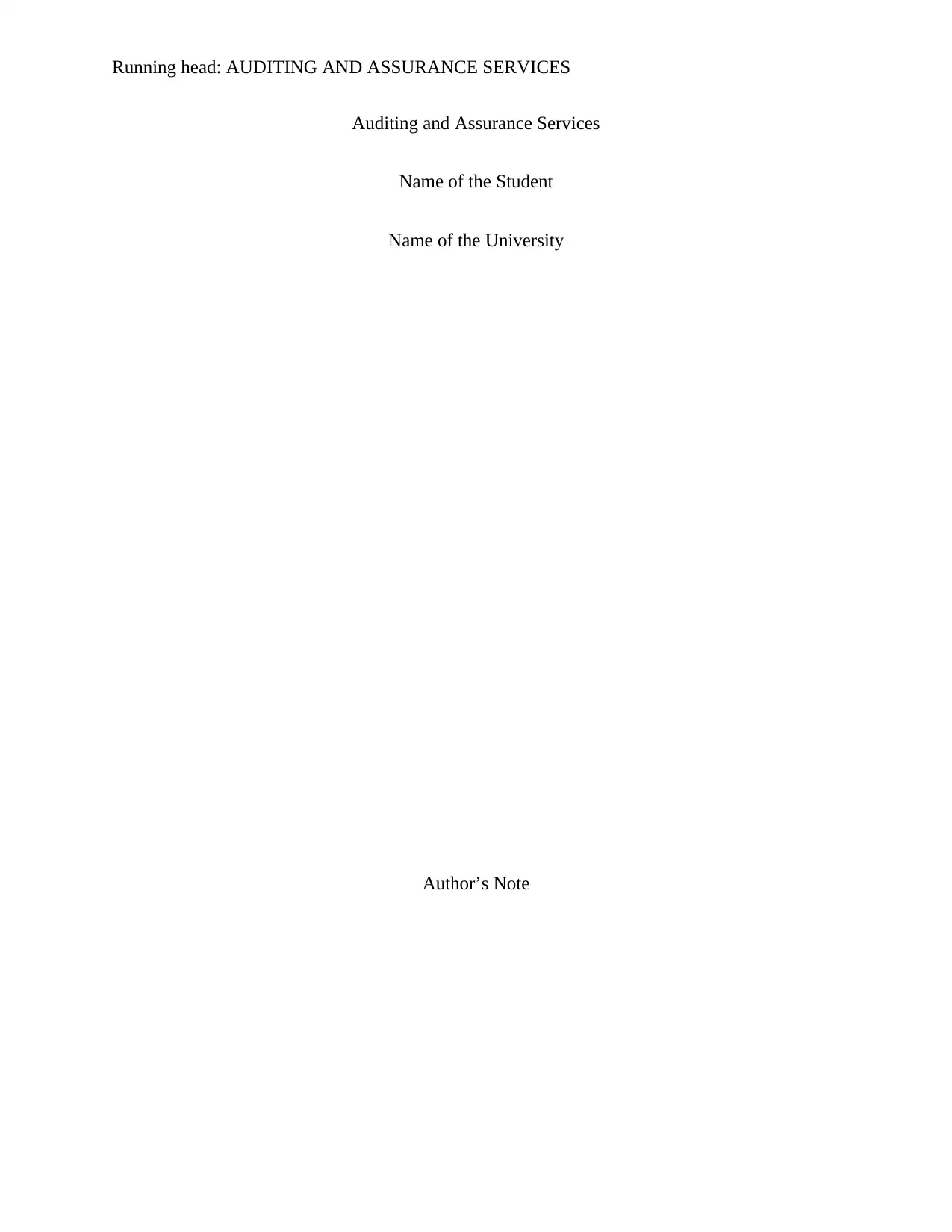
Running head: AUDITING AND ASSURANCE SERVICES
Auditing and Assurance Services
Name of the Student
Name of the University
Author’s Note
Auditing and Assurance Services
Name of the Student
Name of the University
Author’s Note
Secure Best Marks with AI Grader
Need help grading? Try our AI Grader for instant feedback on your assignments.
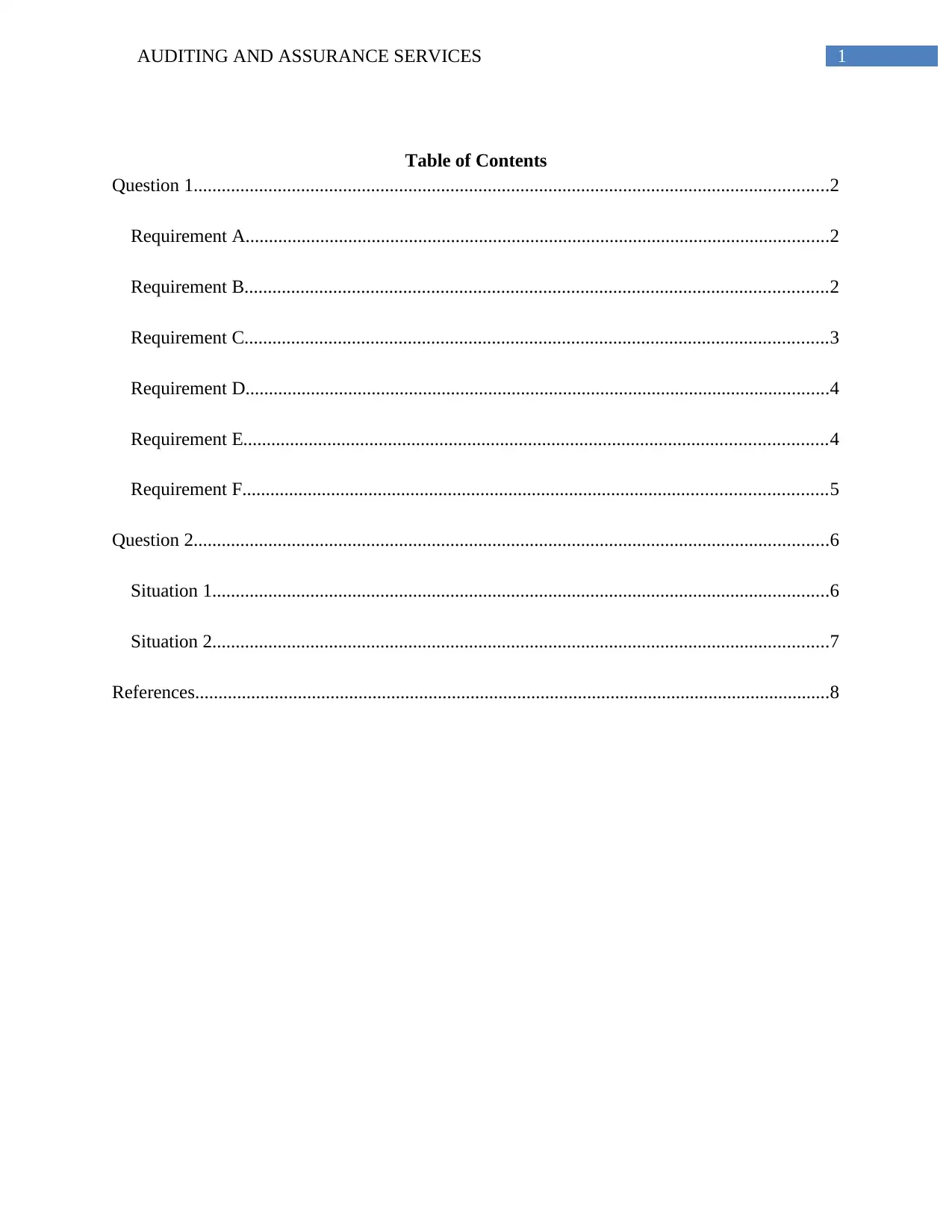
1AUDITING AND ASSURANCE SERVICES
Table of Contents
Question 1........................................................................................................................................2
Requirement A.............................................................................................................................2
Requirement B.............................................................................................................................2
Requirement C.............................................................................................................................3
Requirement D.............................................................................................................................4
Requirement E.............................................................................................................................4
Requirement F.............................................................................................................................5
Question 2........................................................................................................................................6
Situation 1....................................................................................................................................6
Situation 2....................................................................................................................................7
References........................................................................................................................................8
Table of Contents
Question 1........................................................................................................................................2
Requirement A.............................................................................................................................2
Requirement B.............................................................................................................................2
Requirement C.............................................................................................................................3
Requirement D.............................................................................................................................4
Requirement E.............................................................................................................................4
Requirement F.............................................................................................................................5
Question 2........................................................................................................................................6
Situation 1....................................................................................................................................6
Situation 2....................................................................................................................................7
References........................................................................................................................................8
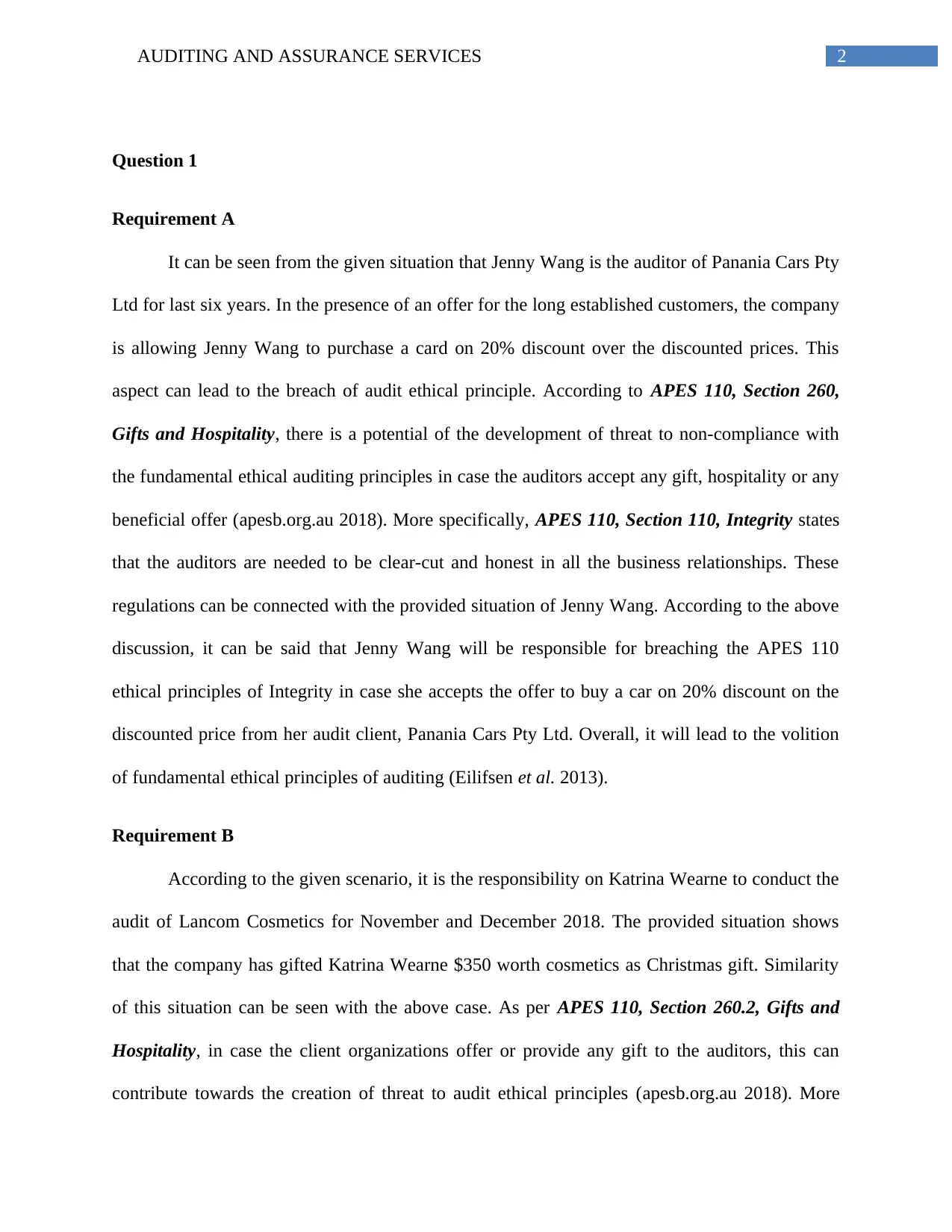
2AUDITING AND ASSURANCE SERVICES
Question 1
Requirement A
It can be seen from the given situation that Jenny Wang is the auditor of Panania Cars Pty
Ltd for last six years. In the presence of an offer for the long established customers, the company
is allowing Jenny Wang to purchase a card on 20% discount over the discounted prices. This
aspect can lead to the breach of audit ethical principle. According to APES 110, Section 260,
Gifts and Hospitality, there is a potential of the development of threat to non-compliance with
the fundamental ethical auditing principles in case the auditors accept any gift, hospitality or any
beneficial offer (apesb.org.au 2018). More specifically, APES 110, Section 110, Integrity states
that the auditors are needed to be clear-cut and honest in all the business relationships. These
regulations can be connected with the provided situation of Jenny Wang. According to the above
discussion, it can be said that Jenny Wang will be responsible for breaching the APES 110
ethical principles of Integrity in case she accepts the offer to buy a car on 20% discount on the
discounted price from her audit client, Panania Cars Pty Ltd. Overall, it will lead to the volition
of fundamental ethical principles of auditing (Eilifsen et al. 2013).
Requirement B
According to the given scenario, it is the responsibility on Katrina Wearne to conduct the
audit of Lancom Cosmetics for November and December 2018. The provided situation shows
that the company has gifted Katrina Wearne $350 worth cosmetics as Christmas gift. Similarity
of this situation can be seen with the above case. As per APES 110, Section 260.2, Gifts and
Hospitality, in case the client organizations offer or provide any gift to the auditors, this can
contribute towards the creation of threat to audit ethical principles (apesb.org.au 2018). More
Question 1
Requirement A
It can be seen from the given situation that Jenny Wang is the auditor of Panania Cars Pty
Ltd for last six years. In the presence of an offer for the long established customers, the company
is allowing Jenny Wang to purchase a card on 20% discount over the discounted prices. This
aspect can lead to the breach of audit ethical principle. According to APES 110, Section 260,
Gifts and Hospitality, there is a potential of the development of threat to non-compliance with
the fundamental ethical auditing principles in case the auditors accept any gift, hospitality or any
beneficial offer (apesb.org.au 2018). More specifically, APES 110, Section 110, Integrity states
that the auditors are needed to be clear-cut and honest in all the business relationships. These
regulations can be connected with the provided situation of Jenny Wang. According to the above
discussion, it can be said that Jenny Wang will be responsible for breaching the APES 110
ethical principles of Integrity in case she accepts the offer to buy a car on 20% discount on the
discounted price from her audit client, Panania Cars Pty Ltd. Overall, it will lead to the volition
of fundamental ethical principles of auditing (Eilifsen et al. 2013).
Requirement B
According to the given scenario, it is the responsibility on Katrina Wearne to conduct the
audit of Lancom Cosmetics for November and December 2018. The provided situation shows
that the company has gifted Katrina Wearne $350 worth cosmetics as Christmas gift. Similarity
of this situation can be seen with the above case. As per APES 110, Section 260.2, Gifts and
Hospitality, in case the client organizations offer or provide any gift to the auditors, this can
contribute towards the creation of threat to audit ethical principles (apesb.org.au 2018). More
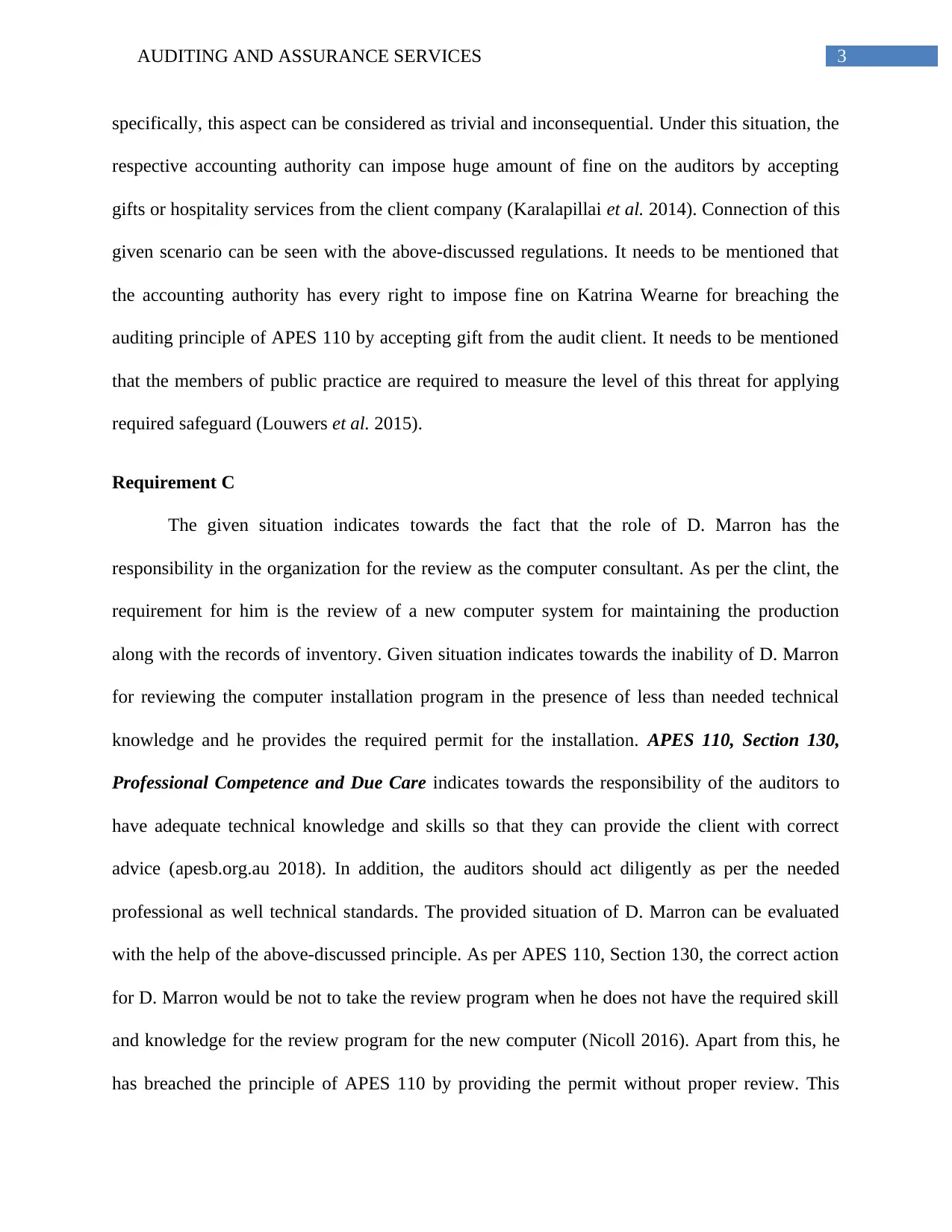
3AUDITING AND ASSURANCE SERVICES
specifically, this aspect can be considered as trivial and inconsequential. Under this situation, the
respective accounting authority can impose huge amount of fine on the auditors by accepting
gifts or hospitality services from the client company (Karalapillai et al. 2014). Connection of this
given scenario can be seen with the above-discussed regulations. It needs to be mentioned that
the accounting authority has every right to impose fine on Katrina Wearne for breaching the
auditing principle of APES 110 by accepting gift from the audit client. It needs to be mentioned
that the members of public practice are required to measure the level of this threat for applying
required safeguard (Louwers et al. 2015).
Requirement C
The given situation indicates towards the fact that the role of D. Marron has the
responsibility in the organization for the review as the computer consultant. As per the clint, the
requirement for him is the review of a new computer system for maintaining the production
along with the records of inventory. Given situation indicates towards the inability of D. Marron
for reviewing the computer installation program in the presence of less than needed technical
knowledge and he provides the required permit for the installation. APES 110, Section 130,
Professional Competence and Due Care indicates towards the responsibility of the auditors to
have adequate technical knowledge and skills so that they can provide the client with correct
advice (apesb.org.au 2018). In addition, the auditors should act diligently as per the needed
professional as well technical standards. The provided situation of D. Marron can be evaluated
with the help of the above-discussed principle. As per APES 110, Section 130, the correct action
for D. Marron would be not to take the review program when he does not have the required skill
and knowledge for the review program for the new computer (Nicoll 2016). Apart from this, he
has breached the principle of APES 110 by providing the permit without proper review. This
specifically, this aspect can be considered as trivial and inconsequential. Under this situation, the
respective accounting authority can impose huge amount of fine on the auditors by accepting
gifts or hospitality services from the client company (Karalapillai et al. 2014). Connection of this
given scenario can be seen with the above-discussed regulations. It needs to be mentioned that
the accounting authority has every right to impose fine on Katrina Wearne for breaching the
auditing principle of APES 110 by accepting gift from the audit client. It needs to be mentioned
that the members of public practice are required to measure the level of this threat for applying
required safeguard (Louwers et al. 2015).
Requirement C
The given situation indicates towards the fact that the role of D. Marron has the
responsibility in the organization for the review as the computer consultant. As per the clint, the
requirement for him is the review of a new computer system for maintaining the production
along with the records of inventory. Given situation indicates towards the inability of D. Marron
for reviewing the computer installation program in the presence of less than needed technical
knowledge and he provides the required permit for the installation. APES 110, Section 130,
Professional Competence and Due Care indicates towards the responsibility of the auditors to
have adequate technical knowledge and skills so that they can provide the client with correct
advice (apesb.org.au 2018). In addition, the auditors should act diligently as per the needed
professional as well technical standards. The provided situation of D. Marron can be evaluated
with the help of the above-discussed principle. As per APES 110, Section 130, the correct action
for D. Marron would be not to take the review program when he does not have the required skill
and knowledge for the review program for the new computer (Nicoll 2016). Apart from this, he
has breached the principle of APES 110 by providing the permit without proper review. This
Secure Best Marks with AI Grader
Need help grading? Try our AI Grader for instant feedback on your assignments.
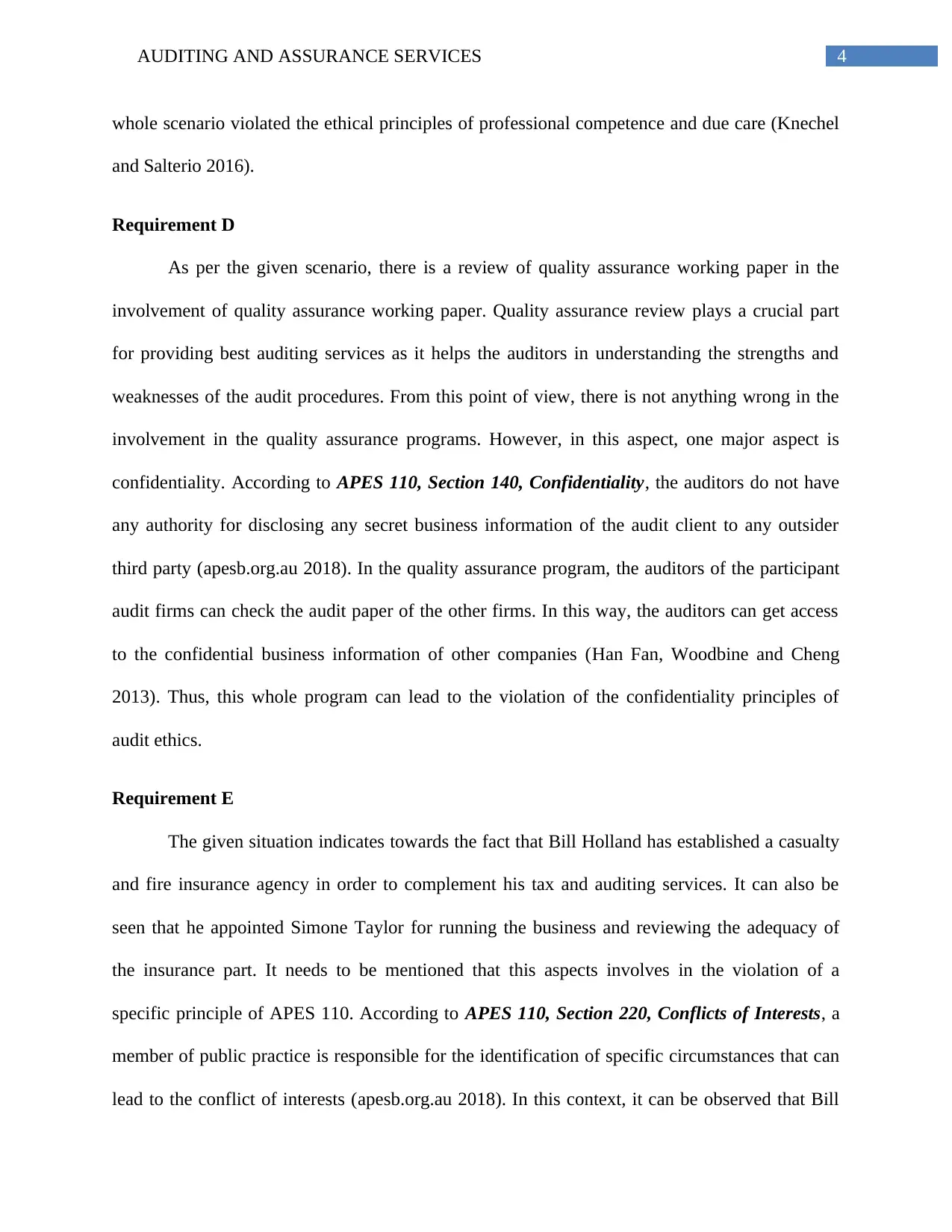
4AUDITING AND ASSURANCE SERVICES
whole scenario violated the ethical principles of professional competence and due care (Knechel
and Salterio 2016).
Requirement D
As per the given scenario, there is a review of quality assurance working paper in the
involvement of quality assurance working paper. Quality assurance review plays a crucial part
for providing best auditing services as it helps the auditors in understanding the strengths and
weaknesses of the audit procedures. From this point of view, there is not anything wrong in the
involvement in the quality assurance programs. However, in this aspect, one major aspect is
confidentiality. According to APES 110, Section 140, Confidentiality, the auditors do not have
any authority for disclosing any secret business information of the audit client to any outsider
third party (apesb.org.au 2018). In the quality assurance program, the auditors of the participant
audit firms can check the audit paper of the other firms. In this way, the auditors can get access
to the confidential business information of other companies (Han Fan, Woodbine and Cheng
2013). Thus, this whole program can lead to the violation of the confidentiality principles of
audit ethics.
Requirement E
The given situation indicates towards the fact that Bill Holland has established a casualty
and fire insurance agency in order to complement his tax and auditing services. It can also be
seen that he appointed Simone Taylor for running the business and reviewing the adequacy of
the insurance part. It needs to be mentioned that this aspects involves in the violation of a
specific principle of APES 110. According to APES 110, Section 220, Conflicts of Interests, a
member of public practice is responsible for the identification of specific circumstances that can
lead to the conflict of interests (apesb.org.au 2018). In this context, it can be observed that Bill
whole scenario violated the ethical principles of professional competence and due care (Knechel
and Salterio 2016).
Requirement D
As per the given scenario, there is a review of quality assurance working paper in the
involvement of quality assurance working paper. Quality assurance review plays a crucial part
for providing best auditing services as it helps the auditors in understanding the strengths and
weaknesses of the audit procedures. From this point of view, there is not anything wrong in the
involvement in the quality assurance programs. However, in this aspect, one major aspect is
confidentiality. According to APES 110, Section 140, Confidentiality, the auditors do not have
any authority for disclosing any secret business information of the audit client to any outsider
third party (apesb.org.au 2018). In the quality assurance program, the auditors of the participant
audit firms can check the audit paper of the other firms. In this way, the auditors can get access
to the confidential business information of other companies (Han Fan, Woodbine and Cheng
2013). Thus, this whole program can lead to the violation of the confidentiality principles of
audit ethics.
Requirement E
The given situation indicates towards the fact that Bill Holland has established a casualty
and fire insurance agency in order to complement his tax and auditing services. It can also be
seen that he appointed Simone Taylor for running the business and reviewing the adequacy of
the insurance part. It needs to be mentioned that this aspects involves in the violation of a
specific principle of APES 110. According to APES 110, Section 220, Conflicts of Interests, a
member of public practice is responsible for the identification of specific circumstances that can
lead to the conflict of interests (apesb.org.au 2018). In this context, it can be observed that Bill
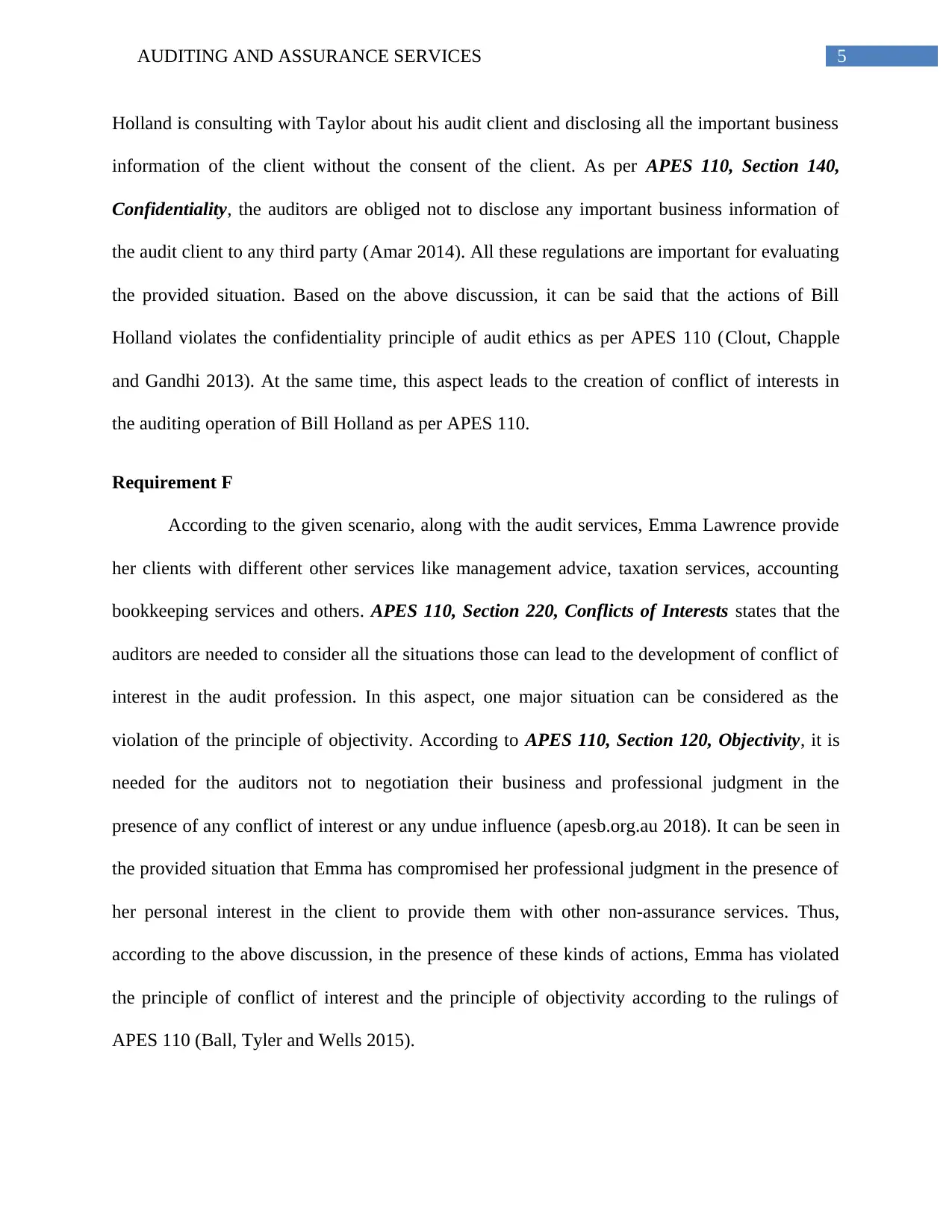
5AUDITING AND ASSURANCE SERVICES
Holland is consulting with Taylor about his audit client and disclosing all the important business
information of the client without the consent of the client. As per APES 110, Section 140,
Confidentiality, the auditors are obliged not to disclose any important business information of
the audit client to any third party (Amar 2014). All these regulations are important for evaluating
the provided situation. Based on the above discussion, it can be said that the actions of Bill
Holland violates the confidentiality principle of audit ethics as per APES 110 (Clout, Chapple
and Gandhi 2013). At the same time, this aspect leads to the creation of conflict of interests in
the auditing operation of Bill Holland as per APES 110.
Requirement F
According to the given scenario, along with the audit services, Emma Lawrence provide
her clients with different other services like management advice, taxation services, accounting
bookkeeping services and others. APES 110, Section 220, Conflicts of Interests states that the
auditors are needed to consider all the situations those can lead to the development of conflict of
interest in the audit profession. In this aspect, one major situation can be considered as the
violation of the principle of objectivity. According to APES 110, Section 120, Objectivity, it is
needed for the auditors not to negotiation their business and professional judgment in the
presence of any conflict of interest or any undue influence (apesb.org.au 2018). It can be seen in
the provided situation that Emma has compromised her professional judgment in the presence of
her personal interest in the client to provide them with other non-assurance services. Thus,
according to the above discussion, in the presence of these kinds of actions, Emma has violated
the principle of conflict of interest and the principle of objectivity according to the rulings of
APES 110 (Ball, Tyler and Wells 2015).
Holland is consulting with Taylor about his audit client and disclosing all the important business
information of the client without the consent of the client. As per APES 110, Section 140,
Confidentiality, the auditors are obliged not to disclose any important business information of
the audit client to any third party (Amar 2014). All these regulations are important for evaluating
the provided situation. Based on the above discussion, it can be said that the actions of Bill
Holland violates the confidentiality principle of audit ethics as per APES 110 (Clout, Chapple
and Gandhi 2013). At the same time, this aspect leads to the creation of conflict of interests in
the auditing operation of Bill Holland as per APES 110.
Requirement F
According to the given scenario, along with the audit services, Emma Lawrence provide
her clients with different other services like management advice, taxation services, accounting
bookkeeping services and others. APES 110, Section 220, Conflicts of Interests states that the
auditors are needed to consider all the situations those can lead to the development of conflict of
interest in the audit profession. In this aspect, one major situation can be considered as the
violation of the principle of objectivity. According to APES 110, Section 120, Objectivity, it is
needed for the auditors not to negotiation their business and professional judgment in the
presence of any conflict of interest or any undue influence (apesb.org.au 2018). It can be seen in
the provided situation that Emma has compromised her professional judgment in the presence of
her personal interest in the client to provide them with other non-assurance services. Thus,
according to the above discussion, in the presence of these kinds of actions, Emma has violated
the principle of conflict of interest and the principle of objectivity according to the rulings of
APES 110 (Ball, Tyler and Wells 2015).
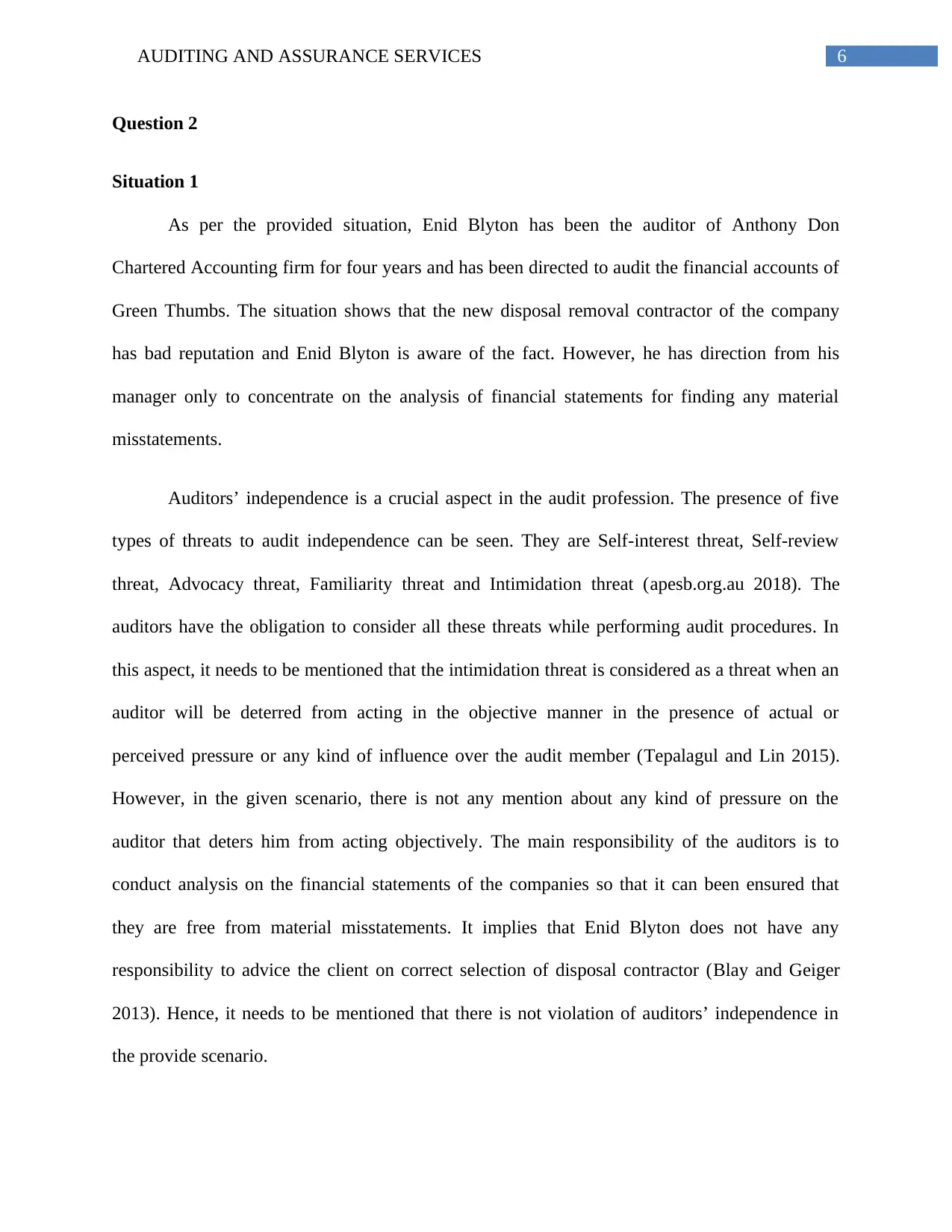
6AUDITING AND ASSURANCE SERVICES
Question 2
Situation 1
As per the provided situation, Enid Blyton has been the auditor of Anthony Don
Chartered Accounting firm for four years and has been directed to audit the financial accounts of
Green Thumbs. The situation shows that the new disposal removal contractor of the company
has bad reputation and Enid Blyton is aware of the fact. However, he has direction from his
manager only to concentrate on the analysis of financial statements for finding any material
misstatements.
Auditors’ independence is a crucial aspect in the audit profession. The presence of five
types of threats to audit independence can be seen. They are Self-interest threat, Self-review
threat, Advocacy threat, Familiarity threat and Intimidation threat (apesb.org.au 2018). The
auditors have the obligation to consider all these threats while performing audit procedures. In
this aspect, it needs to be mentioned that the intimidation threat is considered as a threat when an
auditor will be deterred from acting in the objective manner in the presence of actual or
perceived pressure or any kind of influence over the audit member (Tepalagul and Lin 2015).
However, in the given scenario, there is not any mention about any kind of pressure on the
auditor that deters him from acting objectively. The main responsibility of the auditors is to
conduct analysis on the financial statements of the companies so that it can been ensured that
they are free from material misstatements. It implies that Enid Blyton does not have any
responsibility to advice the client on correct selection of disposal contractor (Blay and Geiger
2013). Hence, it needs to be mentioned that there is not violation of auditors’ independence in
the provide scenario.
Question 2
Situation 1
As per the provided situation, Enid Blyton has been the auditor of Anthony Don
Chartered Accounting firm for four years and has been directed to audit the financial accounts of
Green Thumbs. The situation shows that the new disposal removal contractor of the company
has bad reputation and Enid Blyton is aware of the fact. However, he has direction from his
manager only to concentrate on the analysis of financial statements for finding any material
misstatements.
Auditors’ independence is a crucial aspect in the audit profession. The presence of five
types of threats to audit independence can be seen. They are Self-interest threat, Self-review
threat, Advocacy threat, Familiarity threat and Intimidation threat (apesb.org.au 2018). The
auditors have the obligation to consider all these threats while performing audit procedures. In
this aspect, it needs to be mentioned that the intimidation threat is considered as a threat when an
auditor will be deterred from acting in the objective manner in the presence of actual or
perceived pressure or any kind of influence over the audit member (Tepalagul and Lin 2015).
However, in the given scenario, there is not any mention about any kind of pressure on the
auditor that deters him from acting objectively. The main responsibility of the auditors is to
conduct analysis on the financial statements of the companies so that it can been ensured that
they are free from material misstatements. It implies that Enid Blyton does not have any
responsibility to advice the client on correct selection of disposal contractor (Blay and Geiger
2013). Hence, it needs to be mentioned that there is not violation of auditors’ independence in
the provide scenario.
Paraphrase This Document
Need a fresh take? Get an instant paraphrase of this document with our AI Paraphraser
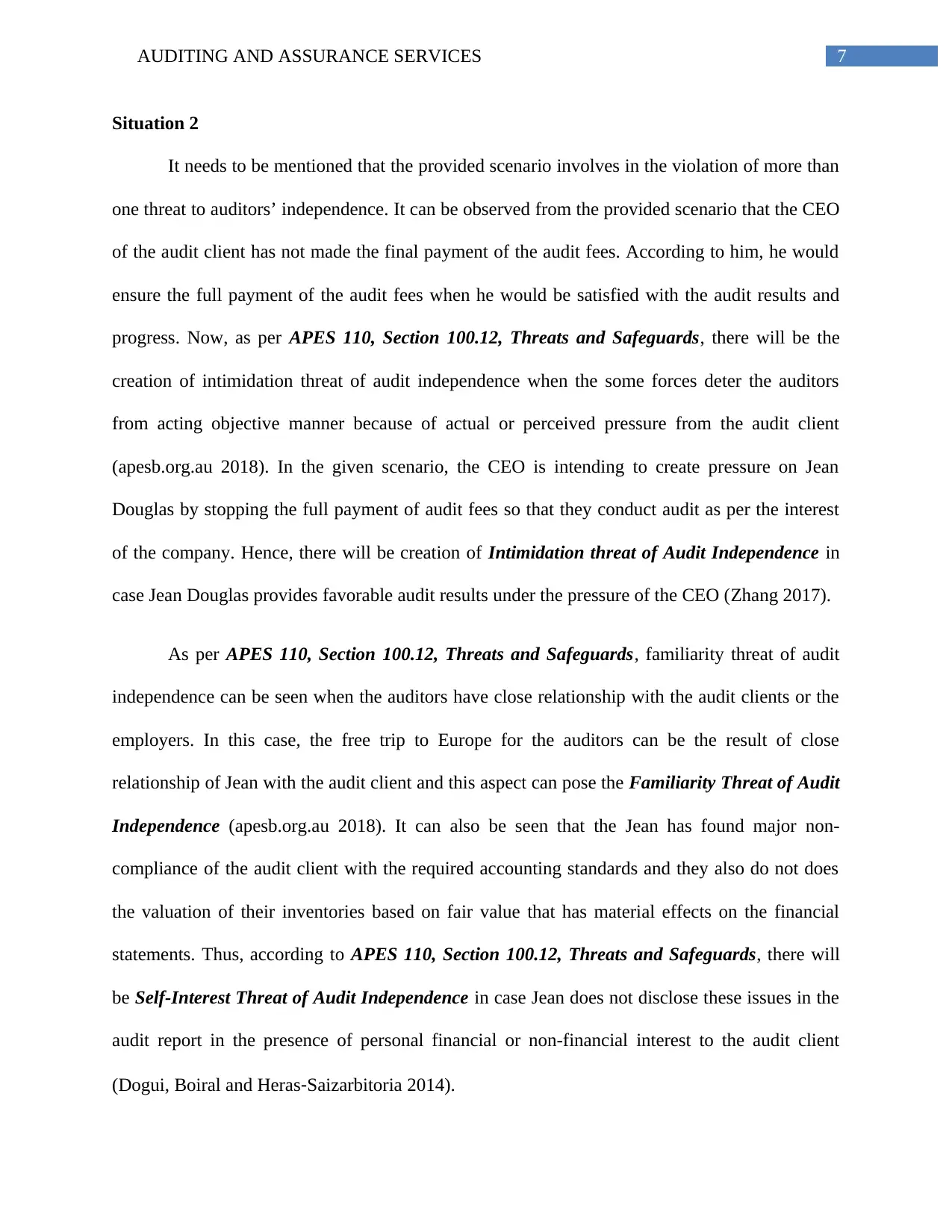
7AUDITING AND ASSURANCE SERVICES
Situation 2
It needs to be mentioned that the provided scenario involves in the violation of more than
one threat to auditors’ independence. It can be observed from the provided scenario that the CEO
of the audit client has not made the final payment of the audit fees. According to him, he would
ensure the full payment of the audit fees when he would be satisfied with the audit results and
progress. Now, as per APES 110, Section 100.12, Threats and Safeguards, there will be the
creation of intimidation threat of audit independence when the some forces deter the auditors
from acting objective manner because of actual or perceived pressure from the audit client
(apesb.org.au 2018). In the given scenario, the CEO is intending to create pressure on Jean
Douglas by stopping the full payment of audit fees so that they conduct audit as per the interest
of the company. Hence, there will be creation of Intimidation threat of Audit Independence in
case Jean Douglas provides favorable audit results under the pressure of the CEO (Zhang 2017).
As per APES 110, Section 100.12, Threats and Safeguards, familiarity threat of audit
independence can be seen when the auditors have close relationship with the audit clients or the
employers. In this case, the free trip to Europe for the auditors can be the result of close
relationship of Jean with the audit client and this aspect can pose the Familiarity Threat of Audit
Independence (apesb.org.au 2018). It can also be seen that the Jean has found major non-
compliance of the audit client with the required accounting standards and they also do not does
the valuation of their inventories based on fair value that has material effects on the financial
statements. Thus, according to APES 110, Section 100.12, Threats and Safeguards, there will
be Self-Interest Threat of Audit Independence in case Jean does not disclose these issues in the
audit report in the presence of personal financial or non-financial interest to the audit client
(Dogui, Boiral and Heras‐Saizarbitoria 2014).
Situation 2
It needs to be mentioned that the provided scenario involves in the violation of more than
one threat to auditors’ independence. It can be observed from the provided scenario that the CEO
of the audit client has not made the final payment of the audit fees. According to him, he would
ensure the full payment of the audit fees when he would be satisfied with the audit results and
progress. Now, as per APES 110, Section 100.12, Threats and Safeguards, there will be the
creation of intimidation threat of audit independence when the some forces deter the auditors
from acting objective manner because of actual or perceived pressure from the audit client
(apesb.org.au 2018). In the given scenario, the CEO is intending to create pressure on Jean
Douglas by stopping the full payment of audit fees so that they conduct audit as per the interest
of the company. Hence, there will be creation of Intimidation threat of Audit Independence in
case Jean Douglas provides favorable audit results under the pressure of the CEO (Zhang 2017).
As per APES 110, Section 100.12, Threats and Safeguards, familiarity threat of audit
independence can be seen when the auditors have close relationship with the audit clients or the
employers. In this case, the free trip to Europe for the auditors can be the result of close
relationship of Jean with the audit client and this aspect can pose the Familiarity Threat of Audit
Independence (apesb.org.au 2018). It can also be seen that the Jean has found major non-
compliance of the audit client with the required accounting standards and they also do not does
the valuation of their inventories based on fair value that has material effects on the financial
statements. Thus, according to APES 110, Section 100.12, Threats and Safeguards, there will
be Self-Interest Threat of Audit Independence in case Jean does not disclose these issues in the
audit report in the presence of personal financial or non-financial interest to the audit client
(Dogui, Boiral and Heras‐Saizarbitoria 2014).
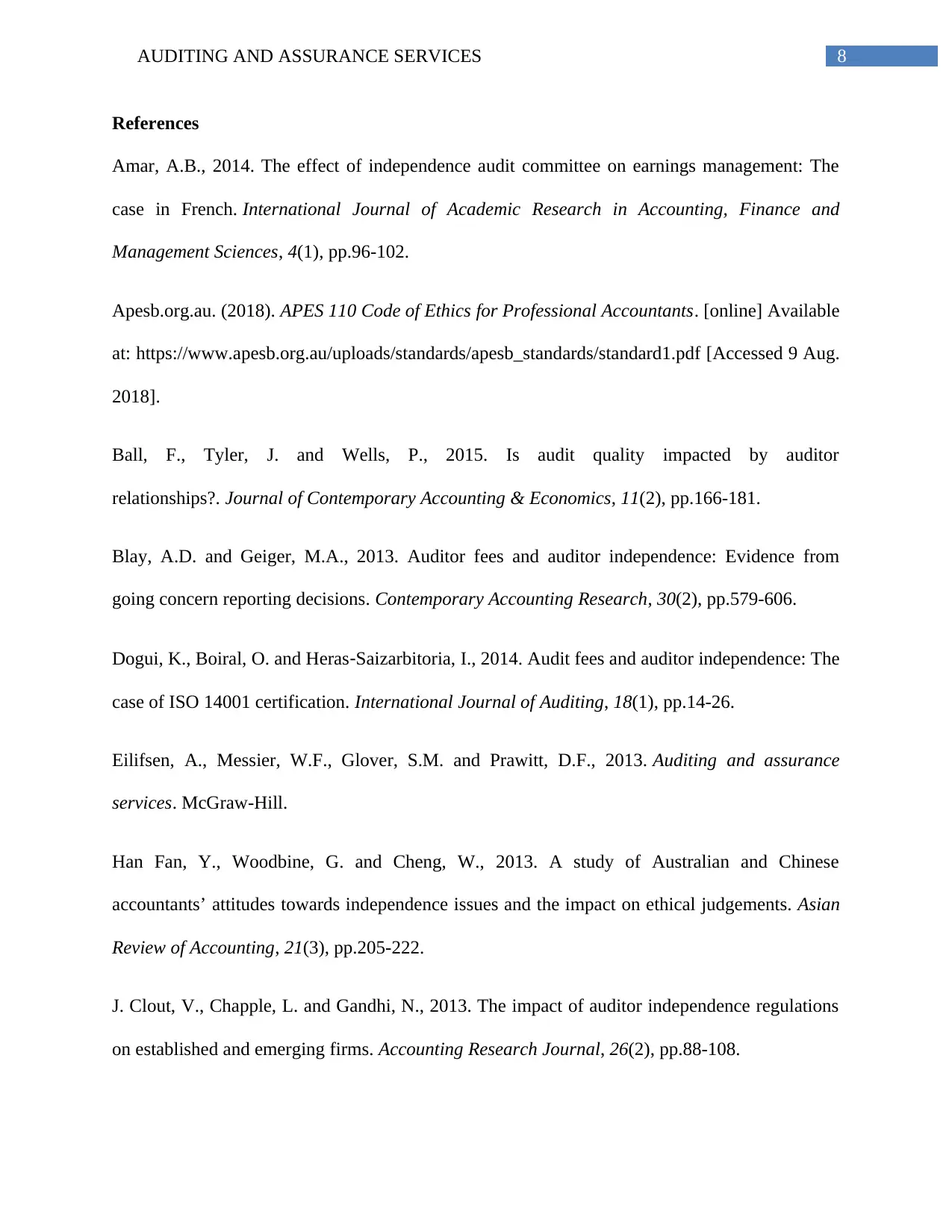
8AUDITING AND ASSURANCE SERVICES
References
Amar, A.B., 2014. The effect of independence audit committee on earnings management: The
case in French. International Journal of Academic Research in Accounting, Finance and
Management Sciences, 4(1), pp.96-102.
Apesb.org.au. (2018). APES 110 Code of Ethics for Professional Accountants. [online] Available
at: https://www.apesb.org.au/uploads/standards/apesb_standards/standard1.pdf [Accessed 9 Aug.
2018].
Ball, F., Tyler, J. and Wells, P., 2015. Is audit quality impacted by auditor
relationships?. Journal of Contemporary Accounting & Economics, 11(2), pp.166-181.
Blay, A.D. and Geiger, M.A., 2013. Auditor fees and auditor independence: Evidence from
going concern reporting decisions. Contemporary Accounting Research, 30(2), pp.579-606.
Dogui, K., Boiral, O. and Heras‐Saizarbitoria, I., 2014. Audit fees and auditor independence: The
case of ISO 14001 certification. International Journal of Auditing, 18(1), pp.14-26.
Eilifsen, A., Messier, W.F., Glover, S.M. and Prawitt, D.F., 2013. Auditing and assurance
services. McGraw-Hill.
Han Fan, Y., Woodbine, G. and Cheng, W., 2013. A study of Australian and Chinese
accountants’ attitudes towards independence issues and the impact on ethical judgements. Asian
Review of Accounting, 21(3), pp.205-222.
J. Clout, V., Chapple, L. and Gandhi, N., 2013. The impact of auditor independence regulations
on established and emerging firms. Accounting Research Journal, 26(2), pp.88-108.
References
Amar, A.B., 2014. The effect of independence audit committee on earnings management: The
case in French. International Journal of Academic Research in Accounting, Finance and
Management Sciences, 4(1), pp.96-102.
Apesb.org.au. (2018). APES 110 Code of Ethics for Professional Accountants. [online] Available
at: https://www.apesb.org.au/uploads/standards/apesb_standards/standard1.pdf [Accessed 9 Aug.
2018].
Ball, F., Tyler, J. and Wells, P., 2015. Is audit quality impacted by auditor
relationships?. Journal of Contemporary Accounting & Economics, 11(2), pp.166-181.
Blay, A.D. and Geiger, M.A., 2013. Auditor fees and auditor independence: Evidence from
going concern reporting decisions. Contemporary Accounting Research, 30(2), pp.579-606.
Dogui, K., Boiral, O. and Heras‐Saizarbitoria, I., 2014. Audit fees and auditor independence: The
case of ISO 14001 certification. International Journal of Auditing, 18(1), pp.14-26.
Eilifsen, A., Messier, W.F., Glover, S.M. and Prawitt, D.F., 2013. Auditing and assurance
services. McGraw-Hill.
Han Fan, Y., Woodbine, G. and Cheng, W., 2013. A study of Australian and Chinese
accountants’ attitudes towards independence issues and the impact on ethical judgements. Asian
Review of Accounting, 21(3), pp.205-222.
J. Clout, V., Chapple, L. and Gandhi, N., 2013. The impact of auditor independence regulations
on established and emerging firms. Accounting Research Journal, 26(2), pp.88-108.
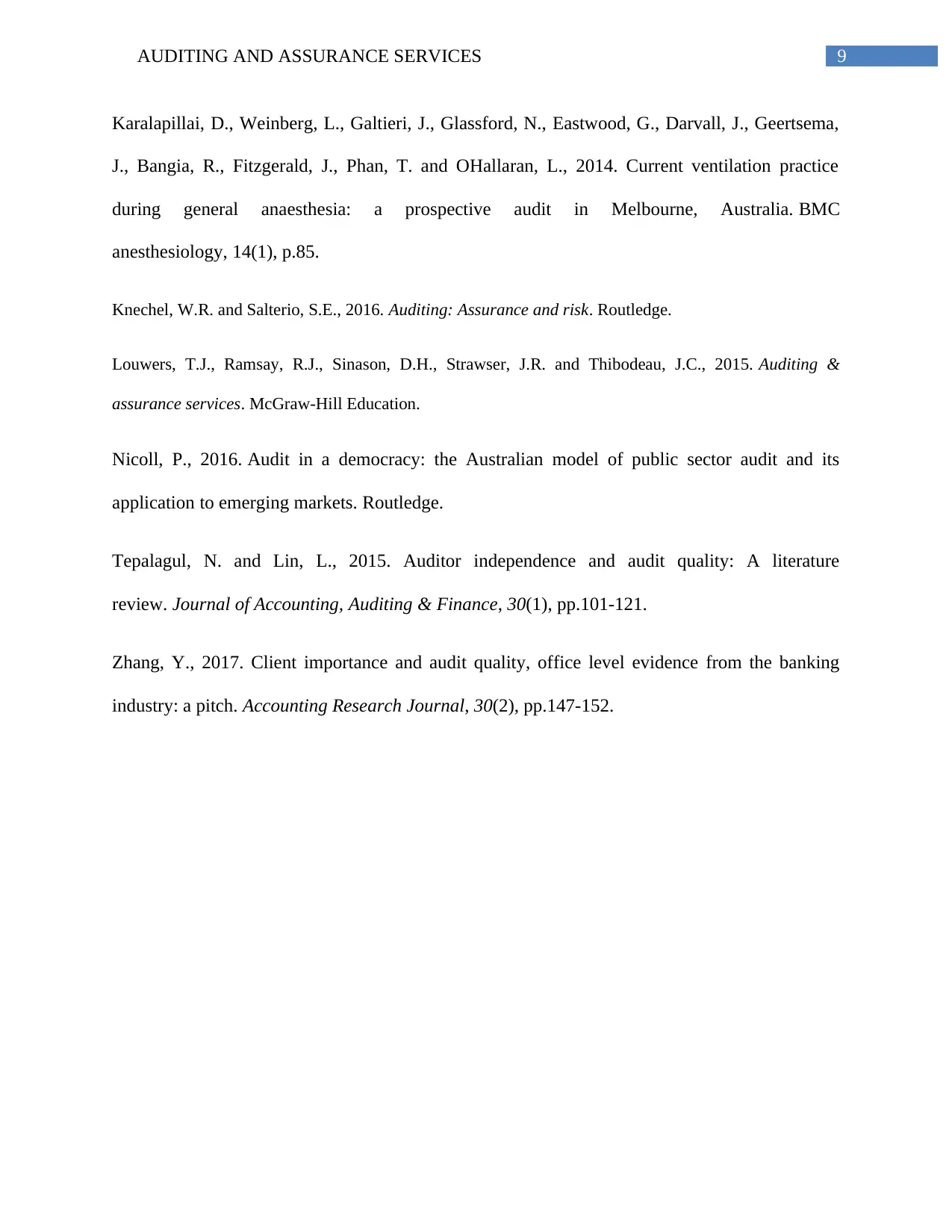
9AUDITING AND ASSURANCE SERVICES
Karalapillai, D., Weinberg, L., Galtieri, J., Glassford, N., Eastwood, G., Darvall, J., Geertsema,
J., Bangia, R., Fitzgerald, J., Phan, T. and OHallaran, L., 2014. Current ventilation practice
during general anaesthesia: a prospective audit in Melbourne, Australia. BMC
anesthesiology, 14(1), p.85.
Knechel, W.R. and Salterio, S.E., 2016. Auditing: Assurance and risk. Routledge.
Louwers, T.J., Ramsay, R.J., Sinason, D.H., Strawser, J.R. and Thibodeau, J.C., 2015. Auditing &
assurance services. McGraw-Hill Education.
Nicoll, P., 2016. Audit in a democracy: the Australian model of public sector audit and its
application to emerging markets. Routledge.
Tepalagul, N. and Lin, L., 2015. Auditor independence and audit quality: A literature
review. Journal of Accounting, Auditing & Finance, 30(1), pp.101-121.
Zhang, Y., 2017. Client importance and audit quality, office level evidence from the banking
industry: a pitch. Accounting Research Journal, 30(2), pp.147-152.
Karalapillai, D., Weinberg, L., Galtieri, J., Glassford, N., Eastwood, G., Darvall, J., Geertsema,
J., Bangia, R., Fitzgerald, J., Phan, T. and OHallaran, L., 2014. Current ventilation practice
during general anaesthesia: a prospective audit in Melbourne, Australia. BMC
anesthesiology, 14(1), p.85.
Knechel, W.R. and Salterio, S.E., 2016. Auditing: Assurance and risk. Routledge.
Louwers, T.J., Ramsay, R.J., Sinason, D.H., Strawser, J.R. and Thibodeau, J.C., 2015. Auditing &
assurance services. McGraw-Hill Education.
Nicoll, P., 2016. Audit in a democracy: the Australian model of public sector audit and its
application to emerging markets. Routledge.
Tepalagul, N. and Lin, L., 2015. Auditor independence and audit quality: A literature
review. Journal of Accounting, Auditing & Finance, 30(1), pp.101-121.
Zhang, Y., 2017. Client importance and audit quality, office level evidence from the banking
industry: a pitch. Accounting Research Journal, 30(2), pp.147-152.
1 out of 10
Related Documents
Your All-in-One AI-Powered Toolkit for Academic Success.
+13062052269
info@desklib.com
Available 24*7 on WhatsApp / Email
![[object Object]](/_next/static/media/star-bottom.7253800d.svg)
Unlock your academic potential
© 2024 | Zucol Services PVT LTD | All rights reserved.


